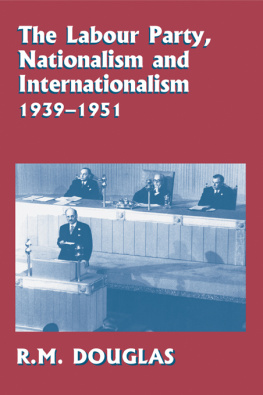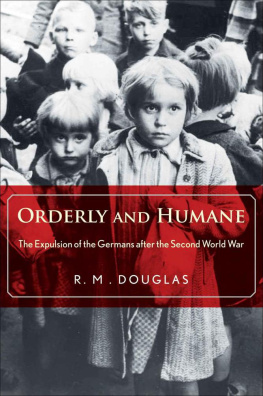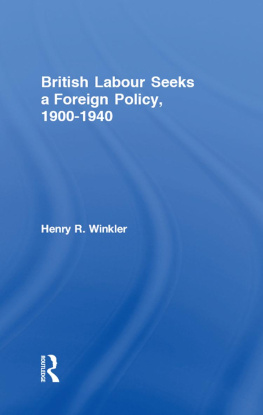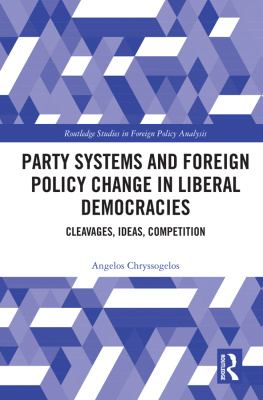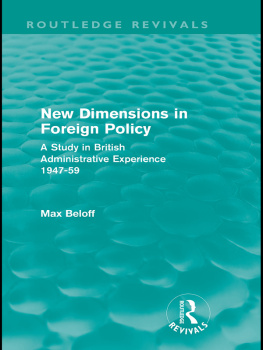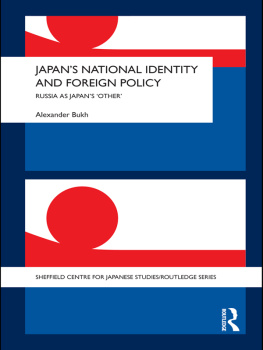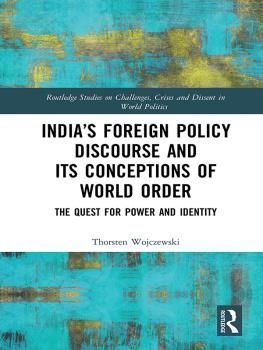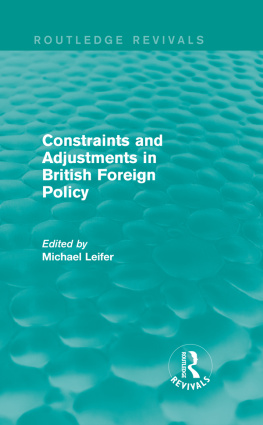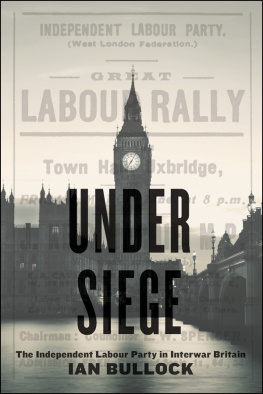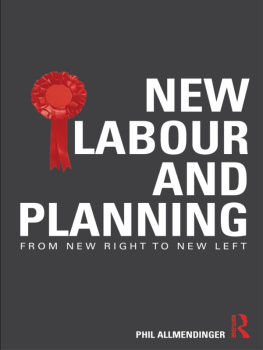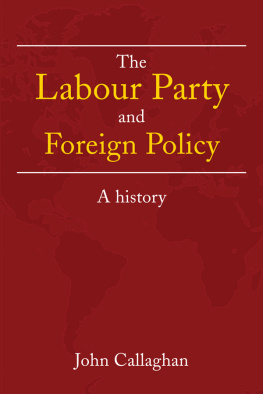The Labour Party, Nationalism and Internationalism, 19391951
BRITISH FOREIGN AND COLONIAL POLICY
Series Editor: PETER CATTERALL
This series provides insights into both the background influences on and the course of policymaking towards Britains extensive overseas interests during the past 200 years.
Whitehall and the Suez Crisis, edited by Saul Kelly and Anthony Gorst
Liberals, International Relations and Appeasement: The Liberal Party, 19191939, Richard S. Grayson
British Government Policy and Decolonisation, 19451963: Scrutinising the Official Mind, Frank Heinlein
Harold Wilson and European Integration: Britains Second Application to Join the EEC, edited by Oliver Daddow
Britain, Israel and the United States, 19551958: Beyond Suez, Orna Almog
The British Political Elite and the Soviet Union, 19371939, Louise Grace Shaw
Britain, Nasser and the Balance of Power in the Middle East, 19521967: From the Egyptian Revolution to the Six Day War, Robert McNamara
British Foreign Secretaries Since 1974, edited by Kevin Theakston
The Labour Party, Nationalism and Internationalism, 19391951, R.M. Douglas
The Labour Party, Nationalism and Internationalism, 19391951
R.M. Douglas
Department of History, Colgate University
First published in 2004 in Great Britain by
Routledge
11 New Fetter Lane, London EC4P 4EE
Simultaneously published in the USA and Canada by
Routledge
29 West 35th Street, New York, NY 10001
Routledge is an imprint of the Taylor & Francis Group
Copyright 2004 R.M. Douglas
British Library Cataloguing in Publication Data
ISBN 0-714-65523-6
Library of Congress Cataloging-in-Publication Data
Douglas, R.M., 1963
The Labour Party, nationalism and internationalism, 19391951: a new world order / R.M. Douglas.
p. cm. (Cass series British foreign and colonial policy, ISSN 1467-5013)
Includes bibliographical references and index.
ISBN 0-7146-5523-6 (cloth)
1. Great Britain Foreign relations 19361945. 2. Great Britain Foreign relations 19451964. 3. Labour Party (Great Britain). 4. Internationalism. 5. Great Britain Politics and government 19361945. 6. Great Britain Politics and government 19451964. I. Title. II. Series.
DA566.7.D674 2004
324.241070904dc22
2003062608
All rights reserved. No part of this publication may be reproduced, stored in or introduced into a retrieval system or transmitted in any form or by any means, electronic, mechanical, photocopying, recording or otherwise, without the prior written permission of the publisher of this book.
Typeset in Palatino 10.5 on 12.5 pt by Cambridge Photosetting Services
Printed in Great Britain by MPG Books Ltd, Victoria Square, Bodmin, Cornwall
Don t-Ollamh L.P. Curtis, Jr aite agus cara
Contents
Series Editors Preface
In a ground-breaking book some 30 years ago, Martin Ceadel used the bitter experience of diplomacy in the 1930s as the context in which to explore the process whereby pacifism in Britain ceased to be an idea with wide, if somewhat vague, appeal. Faced with the stark realities of that decade, it ceased to be in any sense a policy option and instead became, as Ceadel put it, an article of faith for a small minority.
Many in the Labour Party were, of course, never pacifists. But at the high tide of optimism about the League of Nations and the prospects for the World Disarmament Conference of 193234, the distinctions could easily be blurred. Those who opposed all war, in any circumstances, could join with those who felt that the slide to war in 1914 reflected, among other things, the dangers of nationalism and the failings of international organisation. It was only as choices had to be made, in the face of the renewed slide to war in the 1930s, that the chasm opened up between these two positions.
Pacifism may have been consigned to the fringes of the left by the experience of those years, with many erstwhile pacifists recanting their former faith. John Wilmot, elected on a pacifist ticket at the famous 1933 Fulham by-election, for instance, was by the late 1940s, as Minister of Supply in the Attlee government, involved in the creation of Britains atomic bomb. It is the contention of this book, however, that internationalism was not similarly undermined during the 1930s. Indeed, R.M. Douglas argues that internationalism was reinvigorated, but also changed, by the Second World War.
Internationalism was not, of course, confined to the Labour Party. As Richard Grayson has recently argued in this series (Liberals, International Relations and Appeasement: The Liberal Party, 19191939), it was also a distinctive creed of the inter-war Liberal Party. Unlike the Liberals, however, who tended to focus upon the idea of the interdependence of states, Labour emphasised the ideal of international government. Liberal internationalism was thus in many ways a development from liberal nationalism. The latter doctrine held that a shift towards popularly controlled nation-states in the nineteenth century would also ensure the termination of the aggressive habits of territorially (rather than nationally) based ancien rgime states. Liberal enthusiasm for the League of Nations, for instance, was thus as an arena in which states could pacifically co-operate in their mutual interest.
Socialist internationalism, by contrast, tended to emphasise class solidarities across the artificial borders of national frontiers. As Douglas shows, this survived the mobilisation of the European working classes into their various national causes after 1914, at least as a reflex. It may not have meant a great deal to the generally conventionally patriotic masses of Labour voters. Nevertheless, as late as the early 1930s, the Labour Party Conference was still calling for a general strike in the event of war, even when it had become clear, if further proof were needed, that the prospects of sympathetic action by workers elsewhere was nil.
This did not, however, undermine internationalism in the Labour Party. Enjoying the luxury of opposition, they could use the failure to use the League of Nations as an instrument of collective security as a stick with which to beat the Tory-dominated National government, while continuing to hold, in some teleological sense, to the idea of a future world government.
After 1940, however, Labour was no longer in opposition. As Douglas shows, some of the explanations offered in the past for the apparent shifts in the partys doctrines that ensued are little more than unsophisticated variants on the theme of Labour men and Tory measures. Not least as regards the party leader, Clement Attlee, whose enthusiasm for the idea of world government was still being preached to President Kennedy long after his retirement from office, this clearly fails to do justice to the position. Douglas instead seeks to show that what the party sought to do was find new ways of expressing traditional international beliefs in the challenging circumstances of the 1940s. Internationalism, in other words, remained the bedrock on which foreign policy was formulated.
By the time Labour left office in 1951, however, internationalism was seemingly in tatters. The former French Prime Minister, Paul Reynaud, taunted Labour and the German SPD (Social Democratic Party) at the Council of Europe in May that year that, The only thing they have successfully nationalised is socialism itself. This was, however, somewhat unfair. In so far as the European ideal Reynaud held to at that time articulated a clear and internationalist position, itself a debatable proposition, it was not one shared by Labour, with the exception of a small number of backbench enthusiasts. And it certainly did not cohere with the muscular internationalism Douglas here shows the party had developed earlier in the 1940s. That this variant of internationalism in the end proved a cul-de-sac does not mean that the party had to default to some European alternative. Instead, by the 1950s, it was still there in party rhetoric and leaflets. It was clearly still there in Attlees mind in the 1960s. But, as the pamphleteers also pointed out, it was no longer seen as practical politics. Like Ceadel with pacifism in the 1930s, what Douglas is doing here is charting how, in the Labour Party, internationalism ceased to be a core ideology and instead became a faith.

